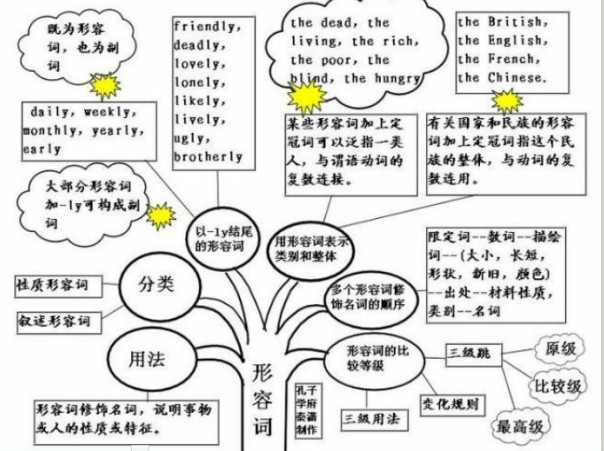本试题 “The ________ looks on her face suggested that Mary ________ the birthday gift from her mother.[ ]A. exciting, likeB. excited, likeC. exciting, like...” 主要考查您对形容词
虚拟语气
等考点的理解。关于这些考点您可以点击下面的选项卡查看详细档案。
- 形容词
- 虚拟语气
形容词的概念:
形容词(adjective),简称adj.或a,形容词用来修饰名词或代词,表示人或事物的性质、状态,和特征的程度好坏与否,形容词在句中作定语、表语、宾语补足语。通常,可将形容词分成性质形容词和叙述形容词两类,其位置不一定都放在名词前面。
形容词的作用与位置:
形容词是用来修饰名词的,常被放在名词前作定语,或放在系动词后面作表语。以下属几种特殊情况,须牢记;
(1)形容词短语作定语,定语后置。
如:a language difficult to master,
a leaning tower about 180 feet high
(2)表语形容词(afraid、alike、alone、asleep、awake、alive等)作定语,定语后置。如a man alive。有些表身体健康状况的形容词如well、faint、ill只作表语。sick既可作表语又可作定语,ill如作定语意为“bad”。
(3)用作定语,修饰由不定代词one、no、any、some和every构成的复合词如anything、something等时,通常后置。
如:I have something important to tell you.
(4)else常用作疑问代词和不定代词的后置定语。
(5)enough、nearby修饰名词前置或后置,程度副词一般位于形容词、副词前面,enough修饰形容词、副词时,必须后置。
(6)几个并列的形容词作定语,其语序通常为:限定语(The、A)+描绘性形容词+size(大小)+shape(形状)+age(年龄、时间)+color(颜色)+origin(国籍、来源)+material(材料)+purpose(目的)+名词。
口诀:
限定描绘大长高,形状年龄和新老;颜色国籍跟材料,作用类别往后靠。
如:a heavy black Chinese steel umbrella,
the man's first tow interesting little red French oil paintings
形容词的用法:
1、形容词修饰名词,说明事物或人的性质或特征。通常,可将形容词分成性质形容词和叙述形容词两类,其位置不一定都放在名词前面:
1)直接说明事物的性质或特征的形容词是性质形容词,它有级的变化,可以用程度副词修饰,在句中可作定语、表语和补语。例如:hot热的。
2)叙述形容词只能作表语,所以又称为表语形容词。这类形容词没有级的变化,也不可用程度副词修饰。
大多数以a开头的形容词都属于这一类。例如:
afraid害怕的。(错)Heisanillman. (对)Themanisill. (错)Sheisanafraidgirl. (对)Thegirlisafraid.
这类词还有:well,unwell,ill,faint,afraid,alike,alive,alone,asleep,awake等。
3)形容词作定语修饰名词时,要放在名词的前边。但是如果形容词修饰以-thing为字尾的词语时,要放在这些词之后。例如:somethingnice
2、用形容词表示类别和整体:
1)某些形容词加上定冠词可以泛指一类人,与谓语动词的复数连接。如:the dead,the living,the rich,the poor,the blind,the hungry The poorarelosinghope.穷人失去了希望。
2)有关国家和民族的形容词加上定冠词指这个民族的整体,与动词的复数连用。如:the British,the English,the French,the Chinese. The English have wonderful senseofhumor.
以-ly结尾的形容词:
1)大部分形容词加-ly可构成副词。但friendly,deadly,lovely,lonely,likely,lively,ugly,brotherly,仍为形容词。改错:
如:(错)She sang lovely.
(错)He spoke to me very friendly.
(对)Her singing was lovely.
(对)He spoke to me in a very friendly way.
2)有些以-ly结尾既为形容词,也为副词。 daily,weekly,monthly,yearly,early .
如:The Times is a daily paper.
The Times is published daily.
形容词知识体系:

复合形容词的构成:
(1)形容词+名词+ed:
如:kind-hearted 好心的,white-haired 白发的
(2)形容词+形容词:
如:red-hot 炽热的,dark-blue 深蓝的
(3)形容词+现在分词:
如:good-looking 好看的,easy-going 随和的
(4)副词+现在分词:
如:hard-working 勤劳的,fast-moving 快速转动的
(5)副词+过去分词:
如:hard-won 得来不易的,newly-made 新建的
(6)名词+形容词:
如:life-long 终生的,world-famous 世界闻名的
(7)名词+现在分词:
如:peace-loving 爱好和平的,fun-loving 爱开玩笑的
(8)名词+过去分词:
如:snow-covered 白雪覆盖的,hand-made 手工的
(9)数词+名词+ed:
如:four-storeyed 4层楼的,three-legged 3条腿的
(10)数词+名词(名词用单数):
如:ten-year 10年的, two-man 两人的
虚拟语气的概念:
虚拟语气用来表示说话人的主观愿望或假想,所说的是一个条件,不一定是事实,或与事实相反。在条件句中的应用条件句可分为两类,一类为真实条件句,一类为非真实条件句。非真实条件句表示的是假设的或实际可能性不大的情况,故采用虚拟语气。
虚拟语气在条件句中的应用:
一、真实条件句:
真实条件句真实条件句用于陈述语气,假设的情况可能发生,其中if是如果的意思。
时态关系句型:条件从句:一般现在时;主句:shall/will+动词原形
如:If he comes, he will bring his violin.
典型例题:
The volleyball match will be put off if it___.
A. will rain
B. rains
C. rained
D. is rained
答案:B。真实条件句主句为将来时,从句用一般现在时。
注意:1)在真实条件句中,主句不能用be going to表示将来,该用shall, will。
如: (错) If you leave now, you are never going to regret it.
(对) If you leave now, you will never regret it.
2)表示真理时,主句谓语动词便不用shall(will)+动词原形,而直接用一般现在时的动词形式。
二、非真实条件句:
非真实条件句表示的是假设的或实际可能性不大的情况,故采用虚拟语气。
1)时态:可以表示过去,现在和将来的情况。它的基本特点是时态退后。
a. 同现在事实相反的假设。
句型:从句:一般过去时;主句:should(would)+动词原形
如:If they were here, they would help you.
b.表示于过去事实相反的假设。
句型:条件从句:过去完成时;主句:should(would)have+过去分词
如:If she had worked harder, she would have succeeded.
The rice would not have been burnt if you had been more careful.
If my lawyer had been here last Saturday, he would have prevented me from going.
c.表示对将来的假想句型:
条件从句:一般过去时;主句:should+动词原形
从句: were+不定式;主句:would+动词原形 should+动词原形
如:If you succeeded, everything would be all right.
If you should succeed, everything would be all right.
If you were to succeed, everything would be all right.
三、混合条件句:
主句与从句的动作发生在不同的时间,这时主,从句谓语动词的虚拟语气形式因时间不同而不同,这叫做混合条件句。
如:If you had asked him yesterday, you would know what to do now. (从句与过去事实相反,主句与现在事实相反。)
If it had rained last night (过去), it would be very cold today (现在).
比较if only与only if:
only if表示“只有”;if only则表示“如果……就好了”。If only也可用于陈述语气。
如:I wake up only if the alarm clock rings. 只有闹钟响了,我才会醒。
If only the alarm clock had rung. 当时闹钟响了,就好了。
If only he comes early. 但愿他早点回来。
It is(high) time that It is(high) time that 后面的从句谓语动词要用过去式或用should加动词原形,但should不可省略。
如:It is time that the children went to bed.
It is high time that the children should go to bed.
need“不必做”和“本不该做"”
didn't need to do表示:过去不必做某事,事实上也没做。
needn'thavedone表示:过去不必做某事,但事实上做了。
如:John went to the station with the car to meet Mary, so she didn't need to walk back home.
约翰开车去车站接玛丽,所以她不必步行回家了。
John went to the station with the car to meet Mary, so she needn't have walked back home.
约翰开车去车站接玛丽,所以她本不必步行回家了。(Mary步行回家,没有遇上John的车。)
典型例题:
There was plenty o ftime. She___.
A. mustn't have hurried
B. couldn't have hurried
C. must not hurry
D. needn't have hurried
答案:D。needn't havedone. 意为"本不必",即已经做了某事,而时实际上不必要。 Mustn't have done用法不正确,对过去发生的事情进行否定性推断应为couldn't have done,“不可能已经”。must not do不可以(用于一般现在时)
特殊的虚拟语气词should 的用法:
1)It is demanded/necessary/a pity+that…结构中的主语从句的谓语动词要用should加动词原形,should可省略。
句型:
如:It is suggested that we(should) hold a meeting next week.
It is necessary that he(should) come to our meeting tomorrow.
2)在宾语从句中的应用在表示命令、建议、要求等一类动词后面的从句中。order, suggest, propose, require, demand, request, insist, command, insist+(should)do
如:I suggest that we(should) hold a meeting next week.
He insisted that he(should) be sent there.
注意:如suggest, insist不表示“建议”或“坚持要某人做某事时”,即它们用于其本意“暗示、表明”、“坚持认为”时,宾语从句用陈述语气。
如:The guard at gate insisted that everybody obey the rules.
判断改错:(错)You pale face suggests that you(should) be ill.
(对)Your pale face suggests that you are ill.
(错)I insisted that you(should) be wrong.
(对)I insisted that you were wrong.
3)在表语从句,同位语从句中的应用在suggestion, proposal, idea, plan, order, advice等名词后面的表语从句、同位语从句中要用虚拟语气,即(should)+动词原形。
如:My idea is that we(should) get more people to attend the conference.
I make a proposal that we(should) hold a meeting next week.
虚拟语气知识体系:
| 条件从句中的谓语动词形式 | 主句中的谓语动词形式 | |
| 与过去事实相反 | had+过去分词 | should/would+have+过去分词 |
| 与现在事实相反 | 过去式 | should/would+动词原形 |
| 与将来事实相反 | 1、过去式 | should/would+动词原形 |
| 2、should+动词原形 | should/would+动词原形 | |
| 3、were to+动词原形 | should/would+动词原形 |
虚拟条件句的倒装:
虚拟条件句的从句部分如果含有were, should, 或had, 可将if省略,再把were, should或had移到从句句首,实行倒装。
如:Were they here now, they could help us.=If they were here now, they could help us.
Had you come earlier, you would have met him=If you had come earlier, you would have met him.
Should it rain, the crops would be saved.=Were it to rain, the crops would be saved.
注意:在虚拟语气的从句中,动词“be”的过去时态一律用“were”,不用was,即在从句中be用were代替。
如:If I were you, I would go to look for him. 如果我是你,就会去找他。
If he were here, everything would be all right. 如果他在这儿,一切都会好的。
典型例题:_____to do the work, I should do it some other day.
A. If were I
B. I were
C. Were I
D. Was I
答案:C. 在虚拟条件状语中如果有were, should, had这三个词,通常将if省略,主语提前,变成were, should, had+主语的形式。
但要注意,在虚拟条件状语从句中,省略连词的倒装形式的句首不能用动词的缩略形式。如我们可说Were I not to do.,而不能说Weren't I to do。
与“The ________ looks on her face suggested that Mary ______...”考查相似的试题有:
- —Let me help you , Tom !—Thank you . I can do it. Here’s ____to hold all these things .A.a big enough caseB.an enou...
- Train services are usually ________ and run regularly every day.A.reliableB.reasonableC.flexibleD.comfortable
- ——Where are the children? The dinner’s going to be completely ruined.——I wish they always late.A.weren’tB.hadn’t be...
- —How do you find the health club?—I . Everyone is saying its management is going from bad to worseA.ought to joinB....
- ---Good morning. I've got an appointment with Miss Smith in the PersonnelDepartment.--Ah, good morning. You _________...
- I was admitted into a famous university. My success______ me pleased with myself but I didn’t .A.might have madeB.m...
- But for the fact that China ____ also affected by the global economic crisis, we ____ fewer unemployed workers now.A...
- —I don’t think you should use the dictionary while reading newspapers.—_____, but I can’t do without it. A.No, I sho...
- Look at the trouble I am in! If only I _____ your advice.[ ]A. followedB. would followC. had followedD. should follow
- — ____ . I''ll be as quiet as a mouse .A.Yes , I won''tB.No , I won''tC.No , I''llD.Yes , I will